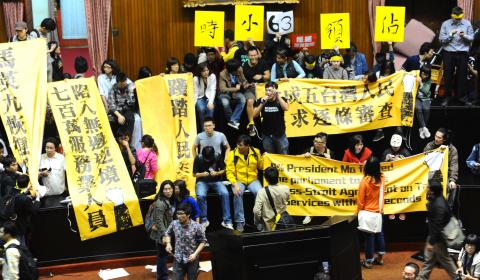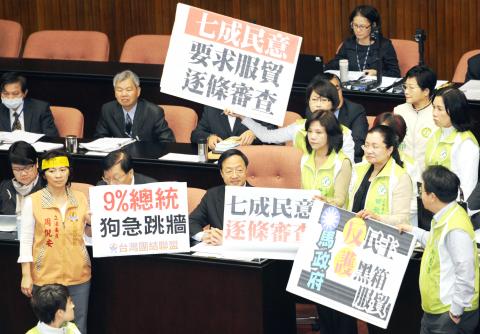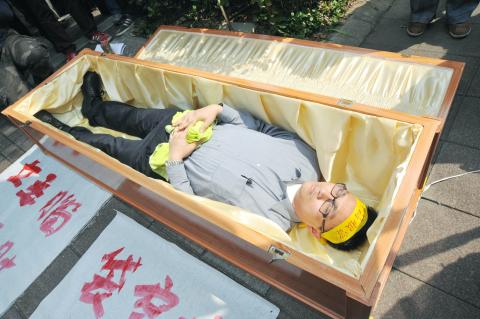Opposition parties and civic groups are working together on a full-scale protest that includes legislative boycotts, a “siege” of the legislature and street rallies after the Chinese Nationalist Party (KMT) cut short the review of the cross-strait service trade agreement on Monday and sent the pact directly to the plenary session for its second reading.
At about 9pm, more than 300 students and demonstrators broke from the rally outside the Legislative Yuan, broke into the compound and took over the podium on the legislative floor.
The police did not evacuate the protesters.

Photo: Chang Chia-ming, Taipei Times.
The protesters staged a sit-in in the assembly hall where lawmakers hold meetings, saying that they would stay there until Friday and until the KMT withdraw the agreement from the plenary.
The protesters called on supporters to bring supplies to the site.
The KMT caucus has breached a previously reached inter-party consensus that the pact — which experts said could severely affect local industries — must be reviewed clause-by-clause in the Legislative Yuan, which has infuriated the public, the opposition said, adding that the move amounted to contempt of parliament and a betrayal of democratic principles.

Photo: Lo Pei-der, Taipei Times
In response, the Democratic Progressive Party (DPP) and the Taiwan Solidarity Union (TSU) boycotted the Legislative Yuan’s plenary session yesterday, forcing Legislative Speaker Wang Jin-pyng (王金平) to announce an adjournment for party negotiations.
Opposition parties vowed to continue boycotting the plenary until the KMT retracts the agreement.
With President Ma Ying-jeou’s (馬英九) administration and the KMT showing no signs of retracting the agreement, DPP Chairman Su Tseng-chang (蘇貞昌) yesterday said the party would launch a series of “countermeasures” against the KMT over the next three days.

Photo: Mandy Cheng, AFP
The DPP said that it would propose a “better agreement” than the current service trade pact in its Central Standing Committee meeting today and convene a meeting with representatives from various industries and civic groups tomorrow to discuss the establishment of an alliance to monitor the review of the agreement.
In addition, the party plans to launch a campaign to “besiege” the Legislative Yuan.
“Our goal to review the pact clause-by-clause and to renegotiate the deal remains unchanged,” Su said.
The TSU is mobilizing its supporters and industry representatives to “besiege” the Legislative Yuan on Friday, with TSU Chairman Huang Kun-huei (黃昆輝) accusing the KMT of breaching the consensus, which Huang called unacceptable.
Speaking to reporters after the plenary session yesterday, Wang said that although the KMT’s handling of the review surprised him, he would not speculate on what the pan-blue and pan-green camps would do next week.
While another round of inter-party negotiation is needed, “the atmosphere is not appropriate for both camps to sit down and talk at this moment,” Wang said.
At separate press conferences, DPP caucus director-general Gao Jyh-peng (高志鵬) said that the party would continue boycotting plenary sessions until the KMT offers a concession, while DPP Deputy Secretary-General Lee Chun-yi (李俊毅) insisted that the agreement should stay in the committee and be reviewed line-by-line.
Former premier Frank Hsieh (謝長廷) of the DPP posted on Facebook that he supported an “all-out protest” in collaboration with the public against the KMT.
Dozens of civic group representatives and students, who have had been camping outside the Legislative Yuan since Monday, stepped up their mobilization efforts, urging the public to join the sit-in and an overnight rally to voice their opposition to what they called the KMT’s “brutal” decision that had completely ignored the interests of the Taiwanese.
DPP lawmakers Hsiao Bi-khim (蕭美琴), Wu Yi-chen (吳宜臻) and Wu Ping-jui (吳秉叡) also staged a 70-hour hunger strike, which began at noon yesterday and would last until 10am on Friday, when a plenary session is scheduled to commence.
The protest in front of the Legislative Yuan would continue until Friday, according to Lai Chung-chiang (賴中強), convener of the Democratic Front Against the Cross-strait Trade in Services Agreement and spokesperson of the rally.
Beginning yesterday morning, the police have reinforced deployment and have installed a road block around the Legislative Yuan compound to keep the protesters from entering the compound and to prepare for the planned siege on Friday.

Taiwan is gearing up to celebrate the New Year at events across the country, headlined by the annual countdown and Taipei 101 fireworks display at midnight. Many of the events are to be livesteamed online. See below for lineups and links: Taipei Taipei’s New Year’s Party 2026 is to begin at 7pm and run until 1am, with the theme “Sailing to the Future.” South Korean girl group KARA is headlining the concert at Taipei City Hall Plaza, with additional performances by Amber An (安心亞), Nick Chou (周湯豪), hip-hop trio Nine One One (玖壹壹), Bii (畢書盡), girl group Genblue (幻藍小熊) and more. The festivities are to

Auckland rang in 2026 with a downtown fireworks display launched from New Zealand’s tallest structure, Sky Tower, making it the first major city to greet the new year at a celebration dampened by rain, while crowds in Taipei braved the elements to watch Taipei 101’s display. South Pacific countries are the first to bid farewell to 2025. Clocks struck midnight in Auckland, with a population of 1.7 million, 18 hours before the famous ball was to drop in New York’s Times Square. The five-minute display involved 3,500 fireworks launched from the 240m Sky Tower. Smaller community events were canceled across New Zealand’s

‘IRRESPONSIBLE’: Beijing’s constant disruption of the ‘status quo’ in the Taiwan Strait has damaged peace, stability and security in the Indo-Pacific region, MOFA said The Presidential Office yesterday condemned China’s launch of another military drill around Taiwan, saying such actions are a “unilateral provocation” that destabilizes regional peace and stability. China should immediately stop the irresponsible and provocative actions, Presidential Office spokeswoman Karen Kuo (郭雅慧) said, after the Chinese People’s Liberation Army (PLA) yesterday announced the start of a new round of joint exercises around Taiwan by the army, navy and air force, which it said were approaching “from different directions.” Code-named “Justice Mission 2025,” the exercises would be conducted in the Taiwan Strait and in areas north, southwest, southeast and east of Taiwan

UNDER WAY: The contract for advanced sensor systems would be fulfilled in Florida, and is expected to be completed by June 2031, the Pentagon said Lockheed Martin has been given a contract involving foreign military sales to Taiwan to meet what Washington calls “an urgent operational need” of Taiwan’s air force, the Pentagon said on Wednesday. The contract has a ceiling value of US$328.5 million, with US$157.3 million in foreign military sales funds obligated at the time of award, the Pentagon said in a statement. “This contract provides for the procurement and delivery of 55 Infrared Search and Track Legion Enhanced Sensor Pods, processors, pod containers and processor containers required to meet the urgent operational need of the Taiwan air force,” it said. The contract’s work would be